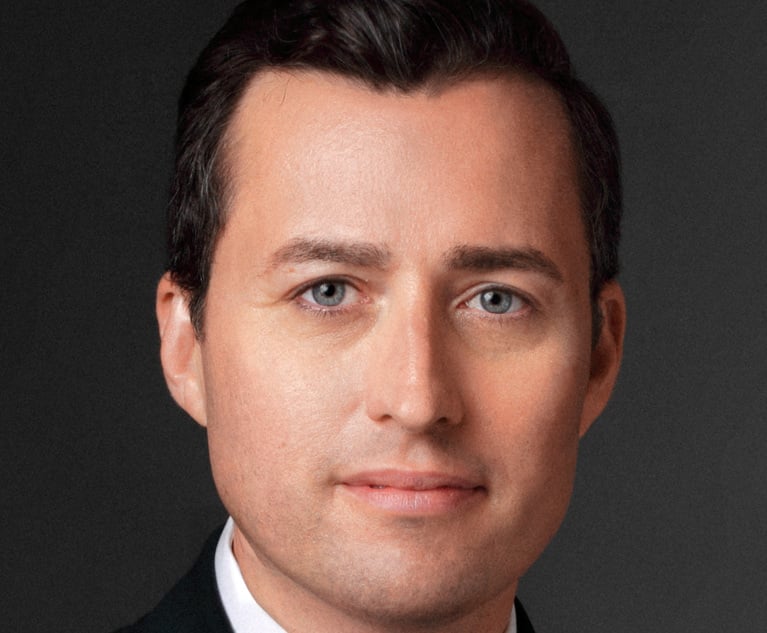In Time Warner Lawyer's Suicide, Circuit Upholds Life Insurance Policies' Exclusion Clauses
The Third Circuit said the mere details of the lawyer's death were sufficient circumstantial evidence to show that she knew her actions would end her life.
September 19, 2019 at 09:36 AM
4 minute read
The original version of this story was published on New Jersey Law Journal
 James A. Byrne federal courthouse in Philadelphia. (Photo: Paul D'Annunzio/ALM)
James A. Byrne federal courthouse in Philadelphia. (Photo: Paul D'Annunzio/ALM)
The U.S. Court of Appeals for the Third Circuit has affirmed a ruling that an insurance company is not obligated to pay $3.5 million from two life insurance policies in the name of a Time Warner lawyer who committed suicide.
Christine Arena ended her life at age 41 at her family's home in Upper Montclair. Her husband, Gianfranco Arena, sued the RiverSource Life Insurance Co., claiming its policy exclusions for suicide should not apply because Christine Arena was taking psychotropic medications at the time of death that left her unable to understand the consequences of her actions or to form the requisite intent to kill herself.
But the Third Circuit said the mere details of her death were sufficient circumstantial evidence to show that she knew her actions would end her life. The appeals court, acknowledging the assertion of a plaintiff's expert that Christine Arena's medications may have caused her to act impulsively and obfuscated her ability to form the requisite intent, said that "acting on an irresistible impulse is different than having no intent or no comprehension of the actions one is taking."
Christine Arena graduated from Fordham Law School in 1999, then worked for six years at Cravath, Swaine & Moore in New York before joining Time Warner. Lawyers from Cravath represented her family in the insurance dispute.
Christine Arena and her husband were experiencing financial difficulties at the time of her death. They owed $60,000 in back taxes to the Internal Revenue Service, and the sale of their existing home had fallen through after they already had purchased a new one for $1.3 million.
After the sale fell through, she began seeing a psychiatrist, Lester Noah Shaw. The doctor found she did not fit the criteria for clinical depression and was at a low risk of suicide, but he prescribed her Clonazepam and Sertraline, the generic versions of Klonopin and Zoloft. Later, the doctor increased her dose for both medications and then added a prescription for another antidepressant, Trazodone.
Christine Arena was rushed to a hospital after hanging herself in April 2015 and died nine days later. The police listed the incident as a suicide attempt and the medical examiner listed the manner of death as suicide.
U.S. District Judge Jose Linares dismissed the underlying lawsuit in December 2018. On appeal, Third Circuit Judges Michael Chagares, Kent Jordan and L. Felipe Restrepo acknowledge Gianfranco Arena's assertion that a policy exclusion for suicide only applies if a decedent intended to cause his or her death.
But the actions leading up to Christine Arena's death are sufficient to establish "not only that Arena had awareness that those actions would end her life but also that she intended to do so," Jordan wrote for the court. RiverSource was not required to produce direct evidence in the form of a suicide note or contemporaneous expression of her intentions.
Gianfranco Arena argued that his wife's mental state was akin to a situation described in Johnson v. Metropolitan Life Insurance, a 1968 Third Circuit case establishing that killing oneself does not always include the element of intent. He claimed that his wife's mental disorder was so extreme, she had no comprehension of what she was doing. He cited testimony from family and friends that she would never end her own life if she had been thinking clearly. But the Third Circuit judges said that evidence of her mental state being inconsistent with suicide, as well as her moral aversion to suicide, are not legally material. That evidence "does not undermine the undisputed facts which can only be explained as an effort to kill herself," the panel said.
Kevin Orsini and Rory Leraris of Cravath, who represented Gianfranco Arena, did not respond to requests for comment about the ruling. Jay Blumenkopf and Sara Frey of Gordon Rees Scully Mansukhani represented RiverSource. Blumenkopf declined to comment on the ruling.
This content has been archived. It is available through our partners, LexisNexis® and Bloomberg Law.
To view this content, please continue to their sites.
Not a Lexis Subscriber?
Subscribe Now
Not a Bloomberg Law Subscriber?
Subscribe Now
NOT FOR REPRINT
© 2025 ALM Global, LLC, All Rights Reserved. Request academic re-use from www.copyright.com. All other uses, submit a request to [email protected]. For more information visit Asset & Logo Licensing.
You Might Like
View All
Uber Files RICO Suit Against Plaintiff-Side Firms Alleging Fraudulent Injury Claims
3 minute read
Insurance Company Sues Over 180 Health Care Providers for Fraud Under RICO
3 minute read
New York Court of Appeals Tightens Pleading Standards Against Insurance Policyholder
7 minute read
Amid Growing Litigation Volume, Don't Expect UnitedHealthcare to Change Its Stripes After CEO's Killing
6 minute readTrending Stories
- 1Dissenter Blasts 4th Circuit Majority Decision Upholding Meta's Section 230 Defense
- 2NBA Players Association Finds Its New GC in Warriors Front Office
- 3Prenuptial Agreement Spousal Support Waivers: Proceed With Caution
- 4DC Circuit Keeps Docs in Judge Newman's Misconduct Proceedings Sealed
- 5Litigators of the Week: US Soccer and MLS Fend Off Claims They Conspired to Scuttle Rival League’s Prospect
Who Got The Work
J. Brugh Lower of Gibbons has entered an appearance for industrial equipment supplier Devco Corporation in a pending trademark infringement lawsuit. The suit, accusing the defendant of selling knock-off Graco products, was filed Dec. 18 in New Jersey District Court by Rivkin Radler on behalf of Graco Inc. and Graco Minnesota. The case, assigned to U.S. District Judge Zahid N. Quraishi, is 3:24-cv-11294, Graco Inc. et al v. Devco Corporation.
Who Got The Work
Rebecca Maller-Stein and Kent A. Yalowitz of Arnold & Porter Kaye Scholer have entered their appearances for Hanaco Venture Capital and its executives, Lior Prosor and David Frankel, in a pending securities lawsuit. The action, filed on Dec. 24 in New York Southern District Court by Zell, Aron & Co. on behalf of Goldeneye Advisors, accuses the defendants of negligently and fraudulently managing the plaintiff's $1 million investment. The case, assigned to U.S. District Judge Vernon S. Broderick, is 1:24-cv-09918, Goldeneye Advisors, LLC v. Hanaco Venture Capital, Ltd. et al.
Who Got The Work
Attorneys from A&O Shearman has stepped in as defense counsel for Toronto-Dominion Bank and other defendants in a pending securities class action. The suit, filed Dec. 11 in New York Southern District Court by Bleichmar Fonti & Auld, accuses the defendants of concealing the bank's 'pervasive' deficiencies in regards to its compliance with the Bank Secrecy Act and the quality of its anti-money laundering controls. The case, assigned to U.S. District Judge Arun Subramanian, is 1:24-cv-09445, Gonzalez v. The Toronto-Dominion Bank et al.
Who Got The Work
Crown Castle International, a Pennsylvania company providing shared communications infrastructure, has turned to Luke D. Wolf of Gordon Rees Scully Mansukhani to fend off a pending breach-of-contract lawsuit. The court action, filed Nov. 25 in Michigan Eastern District Court by Hooper Hathaway PC on behalf of The Town Residences LLC, accuses Crown Castle of failing to transfer approximately $30,000 in utility payments from T-Mobile in breach of a roof-top lease and assignment agreement. The case, assigned to U.S. District Judge Susan K. Declercq, is 2:24-cv-13131, The Town Residences LLC v. T-Mobile US, Inc. et al.
Who Got The Work
Wilfred P. Coronato and Daniel M. Schwartz of McCarter & English have stepped in as defense counsel to Electrolux Home Products Inc. in a pending product liability lawsuit. The court action, filed Nov. 26 in New York Eastern District Court by Poulos Lopiccolo PC and Nagel Rice LLP on behalf of David Stern, alleges that the defendant's refrigerators’ drawers and shelving repeatedly break and fall apart within months after purchase. The case, assigned to U.S. District Judge Joan M. Azrack, is 2:24-cv-08204, Stern v. Electrolux Home Products, Inc.
Featured Firms
Law Offices of Gary Martin Hays & Associates, P.C.
(470) 294-1674
Law Offices of Mark E. Salomone
(857) 444-6468
Smith & Hassler
(713) 739-1250






